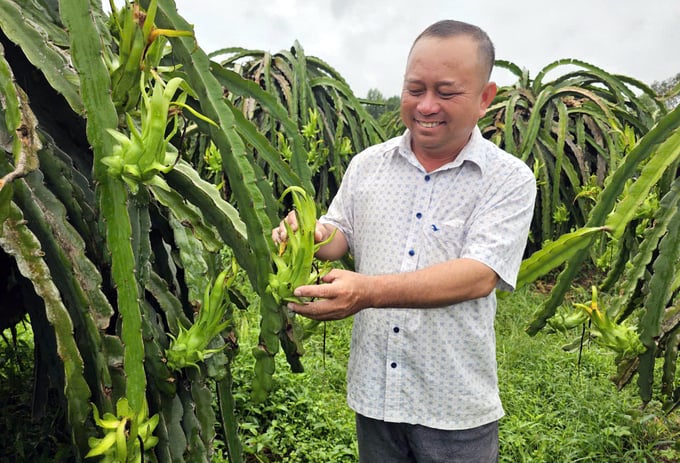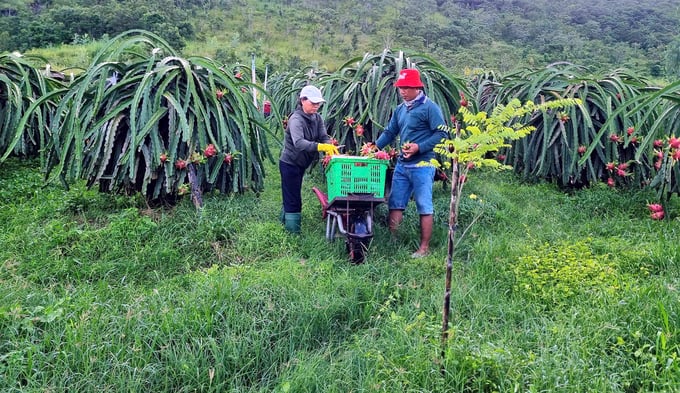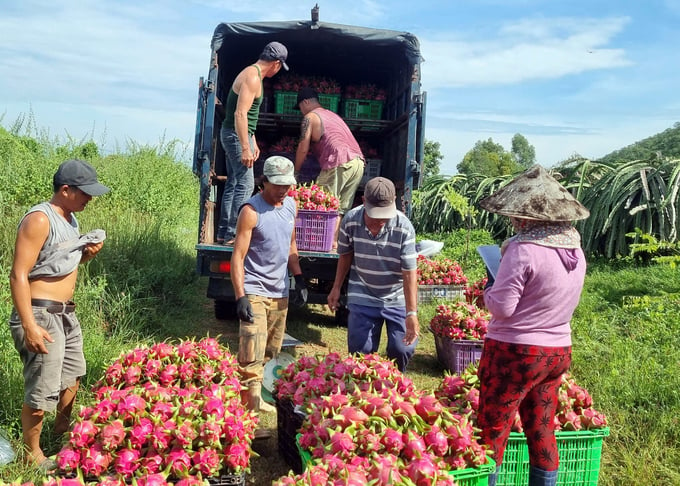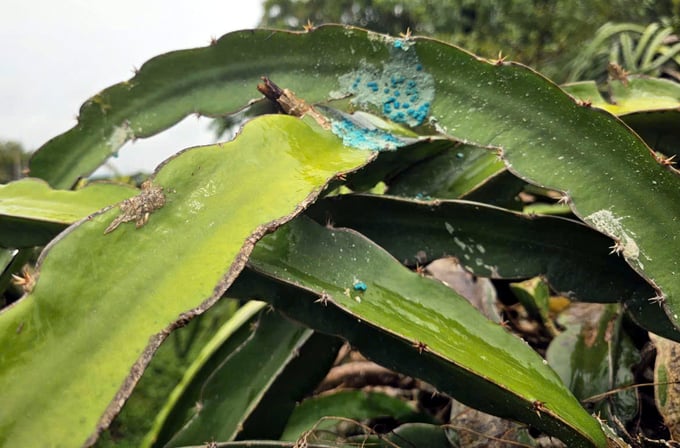May 30, 2025 | 14:01 GMT +7
May 30, 2025 | 14:01 GMT +7
Hotline: 0913.378.918
May 30, 2025 | 14:01 GMT +7
Hotline: 0913.378.918

Mr. Nguyen Van Thanh noted that there is a significant demand from businesses for clean dragon fruit for export. Photo: KS.
We visited the dragon fruit farm of Mr. Nguyen Van Thanh in Thon 2, Ham Duc Commune, Ham Thuan Bac District, Binh Thuan Province, just as his family finished harvesting a batch of 700 plants out of season, yielding approximately 8 tons.
With a selling price of about 1.10 USD/kg secured through a contract with a business, after deducting all costs, Mr. Thanh earns about 0.55 USD/kg, which makes him very pleased.
In contrast, during the same period, traders in the market are purchasing dragon fruit for around $0.50 per kilogram for Grade 1, while the average price is only between 0.21 to 0.26 USD/kg, leaving many farmers with little profit or even losses.
Mr. Thanh explained that he can sell at a higher price because he produces dragon fruit that meets GlobalGAP standards, a certification recognized for quality products worldwide.

A dragon fruit garden belonging to Mr. Thanh has just harvested its crop. Photo: KS.
However, successfully producing products that meet these standards requires farmers to change their traditional farming practices and strictly adhere to the use of fertilizers and pesticides following the "4 rights" principle: the right product, at the right time, in the right concentration and dosage, and in the right manner.
Mr. Thanh is fortunate to be a member of the Clean Dragon Fruit Cooperative Hoa Le and to be linked with the Thuan Tien Dragon Fruit Cooperative. They benefit from the project “Promoting private sector participation in low-carbon investment and climate change adaptation in agriculture for Vietnam's nationally determined contributions”, which has been implemented by the United Nations Development Programme (UNDP) and the Ministry of Agriculture and Rural Development (MARD) in Binh Thuan province since 2021. This project has significantly raised awareness about dragon fruit production.
“The project not only supports cooperative members in transitioning to energy-saving LED lights but also helps in producing dragon fruit that meets GlobalGAP certification”, Mr. Thanh shared. He added that initially, he faced many challenges when trying to produce GlobalGAP dragon fruit, as the first two harvests failed and the products did not meet export standards.

Currently, Mr. Thanh's dragon fruit is supplied to businesses for export to demanding markets. Photo: KS.
It wasn't until the third harvest in 2023 that Mr. Thanh was able to establish a production process that meets the demands of challenging markets such as Europe, the USA, Australia, South Korea, and Japan.
According to Mr. Thanh, since he started producing clean dragon fruit, he has escaped the cycle of “high yield but low prices”. He has secured a stable price with businesses ranging from approximately 1 USD to 1.1 USD/kg for a year, which is significantly higher than market prices. With an area of 4.5 hectares, he produced 100 tons in 2023, earning over 42.500 USD after costs. From the beginning of 2024 to now, he has supplied 140 tons to businesses, resulting in a profit of more than 63.000 USD.
Leading us on a tour of his dragon fruit garden, Mr. Thanh shared that his production process begins with ensuring that the plants are free from diseases and that the dragon fruit vines are healthy. To achieve this, regularly monitoring and checking for fungal infections in the garden is crucial. This allows him to promptly address any infected branches with brown spots or anthracnose, preventing widespread outbreaks.

Mr. Thanh's method for controlling snails that harm dragon fruit. Photo: KS.
In addition to this, Mr. Thanh has shifted his pest control strategy to focus primarily on biological pesticides. To tackle the ant problem that affects his dragon fruit, he employs a clever technique using bait traps made from a mixture of ant poison and dried shrimp, which effectively attracts and eliminates the pests. For small snails that threaten his crops, he uses a combination of lime powder mixed with rice bran, which he spreads around the base of the plants. He also places ant bait mixed with bran on top of the posts to lure the snails. This particular method allows him to maintain snail control for as long as six months. Furthermore, to fight fruit flies, he hangs camphor near the dragon fruit plants. Thanks for these innovative solutions, Mr. Thanh has managed to reduce his reliance on chemical pesticides by approximately 50%.
Since he began producing clean dragon fruit, he has made significant changes to his farming practices, notably by increasing the amount of organic fertilizer he applies while decreasing the use of chemical fertilizers.
“Previously, I used to apply about 4 to 5 kg of well-rotted cow manure to each dragon fruit plant. Now, I’ve increased that amount to between 12 to 15 kg/year. In addition to that, for each harvest, I also add 1 kg of treated chicken manure per plant. This adjustment has allowed me to cut back on chemical fertilizers by half, leading to considerable cost savings”, Mr. Thanh explained.
Thanks to maintaining a clean environment and ensuring that the plants are healthy, Mr. Thanh's dragon fruit farm has seen an impressive increase in yield, achieving levels 1.5 times higher than traditional farming methods. Specifically, his 1-hectare farm can now produce dragon fruit 3 to 4 times a year, with an impressive yield of 40 tons per hectare. In contrast, conventional farms typically yield only between 25 and 30 tons/ha.
Moreover, Mr. Thanh has shared his successful production process with various cooperatives within the linked supply chain, allowing others to benefit from his methods. He also emphasized that the demand for clean dragon fruit in the export market is extremely high, resulting in frequent inquiries from companies eager to source his products.
Translated by Phuong Linh

(VAN) Ms. Nguyen Thi Dung, Deputy Director of Ngoc Hoang Cooperative, shared about the journey of bringing dragon fruit to Europe, achieving annual revenues in the billions of VND.

(VAN) Bamboo products from Thang Tho Bamboo Cooperative have reached many countries around the world, while also creating jobs for local workers.

(VAN) The Management Board of Con Dao National Park reported that a green sea turtle, tagged in the Philippines, has traveled thousands of kilometers to lay 84 eggs on Bay Canh Islet.

(VAN) Green technology is paving a new path for sustainable aquaculture in the Mekong Delta in particular and across the country in general, helping reduce emissions and adapt to climate change.

(VAN) On May 27, La French Tech Vietnam (the French startup and innovation community in Vietnam) held the French Tech Summit Vietnam 2025.
/2025/05/27/4731-2-223159_980.jpg)
(VAN) No votive paper, no styrofoam, no plastic bags, no plastic bottles, and no single-use plastic trays are the key rules tourists should keep in mind when visiting Con Dao.

(VAN) In the fight against plastic pollution, Vietnam has been demonstrating a proactive, pioneering, and active role in addressing the greatest environmental challenge today.